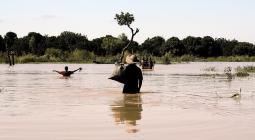The Guardian view on Cop29: poor-world discontent over a failure of rich countries to deliver
A rushed final text in Baku strains trust between nations, as inadequate climate finance commitments leave vulnerable countries calling for justice
The hasty imposition of a deal at the UN climate conference, Cop29, in Azerbaijan, over the objections of poorer nations has fractured global trust and undermined recent progress. This was supposed to be the “finance Cop” when two dozen industrialised countries – including the US, Europe and Canada – promised to pay developing nations for the damage caused by their rise. Instead, developing nations – led by a group including India, Nigeria and Bolivia – say this weekend’s agreement for $300bn a year in 2035 is too little, too late. Worse, rich-world governments will be able to escape their obligations by being able to rely on cash from private companies and international lenders.
Independent experts say the developing world, excluding China, would need $1.3tn a year by 2035 to fund its green transition and keep temperature rises in line with the Paris agreement. The climate finance target, pushed through by the Azerbaijani chair, is described by poor nations as a death sentence for those already drowning under rising seas and facing devastating costs.
Global south leaders argue that wealthy nations, responsible for the climate crisis, have forced vulnerable countries into conceding hollow agreements through coercion and last-minute power-plays. The poor world has to accept crumbs for fear of collapsing the entire Cop process – which is the only forum where they are given a voice – while wealthy nations dodge their moral and historical obligations. Reports from the conference, including last-minute text changes and behind-the-scenes lobbying by fossil fuel interests, suggest these allegations are well-founded.
Cop29 took place in difficult circumstances, made worse by poor preparation by the Azerbaijani presidency, but also by other major countries. However, Europe has a point in saying that the final sum is a step up from rich countries’ previous commitment to provide $100bn annually in climate finance by 2020. That earlier goal was met two years late, in 2022, and expires in 2025. A second Trump presidency looms, threatening to undo US commitments negotiated in Baku.
A lack of transparency and inclusivity will undermine the legitimacy of the agreement. Many smaller nations vow to revisit unresolved issues – especially regarding financing the transition away from fossil fuels – at next year’s Cop30 in Brazil. Clearly, industrialised nations in the global north have spent years dragging their feet on these issues. Ensuring greenhouse gas emissions peak before 2025 to meet the Paris agreement’s preferred 1.5C target now seems like a distant dream. Even if nations adhere to their current promises to reduce domestic emissions, the UN warns that the planet is still on track for a scorching 2.7C rise – ushering in unprecedented climate chaos.
There are signs that big polluters are getting serious – especially among the newly emerging giant economies. Indonesia, one of the world’s top 10 carbon emitters, pledged to phase out coal and other fossil fuels within 15 years and achieve net zero emissions by 2050, a decade ahead of its previous target. Rhetoric should give way to action. The moral and practical imperative for equity and ambition has never been clearer. Next year’s UN talks in Belém must serve as a turning point to deliver on promises and ensure climate justice becomes a reality.
Cover photo: The closing session of Cop29 in Baku, Azerbaijan. Photograph: Bianca Otero/Zuma Press/Rex/Shutterstock




